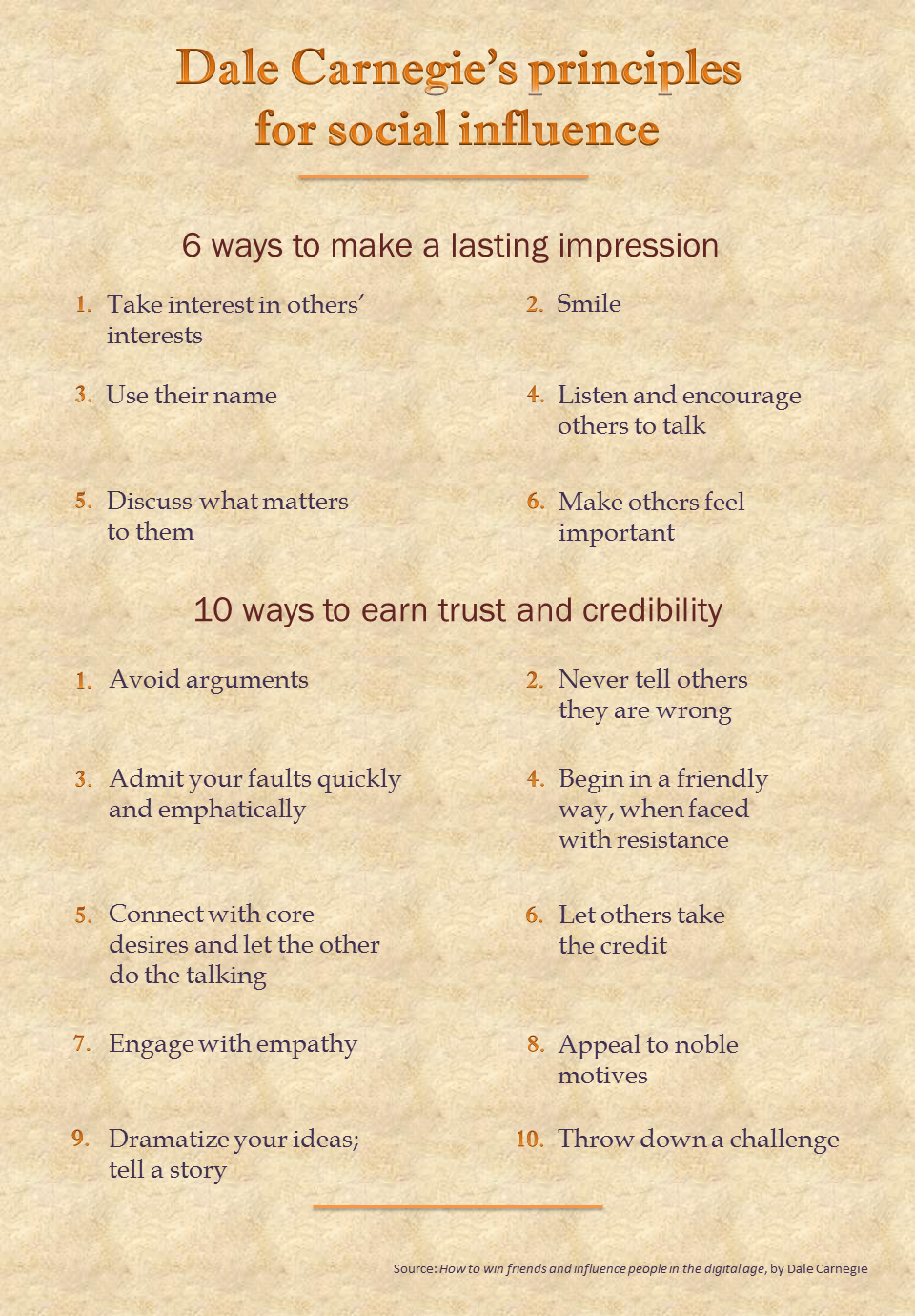Carnegie’s 10 Basic Rules for Working with People
If there’s one thing I remember from reading “How To Win Friends and I Influence People” over ten years ago, it’s that you’ve got to be nice if you want someone else to help you in any way. When my 13-year-old daughter tries to argue with me to get her way, I hand her my worn and torn copy. I’d love for her to learn early that arguing will never get you what you want, rather the opposite will.
Carnegie wrote a similar book about how to do the same in a digital age—which pretty much just takes his original advice and invites it into our workplaces. At work, it can be a challenge to get along with so many different kinds of people during all sorts of stressful situations. We need to be equipped with the mental ability to work with people and do it well—with professionalism and in a way that people respect.
Those of us who are in HR certainly know how important it is to be able to deal with people—even difficult people. Knowing how to effectively deal with people can be an invaluable resource. Here are some ways Carnegie encourages us to earn trust and credibility:
1. Avoid arguments. Well, yeah, on a very basic level this makes perfect sense. One of the best things you can do is assume the other person wants the very best for the team. When you do that, it’s easier to keep emotions under control and not raise your voice. Instead, try to focus your efforts on trying to come up with ways to solve the problem. You may need to wait until after that meeting or tomorrow to give your thoughts on a topic, then wait.
2. Never tell others they are wrong. Even if you believe they are. When working with people, you being right won’t help anything if you are beyond being able to work together.
3. Admit your faults quickly and emphatically. It’s okay to explain that you don’t know as much about something as you’d like to or that you’ve had problems in certain areas. When you come from a place of humility, other people are more willing to try to help.
4. Begin in a friendly way, when faced with resistance. Those who keep themselves composed are showing so much more strength than those who aren’t. Go into a difficult situation—or any situation, really—and be friendly. That’s it. Smile, put on your best face, and handle the situation with dignity.
5. Connect with core desires and let the other do the talking. Pretty much, you need to find the places where you agree and then when you don’t, begin listening. There’s a lot more power in listening than talking. So, remember that you have two ears and only one mouth. Do twice as much listening as talking. That way you truly understand first.
6. Let others take the credit. This is actually a play right out of a great leader’s handbook. They know that it will motivate their people even more if they pass on the credit to others instead of taking it for themselves. If you’ve worked on a project with a coworker, praise the other person. Of course, when someone praises you for something, it’s okay to say “thank you” and move on.
7. Engage with empathy. Using empathy means you consider how others feel and try to understand what they’re going through. It doesn’t have to mean you’re a doormat. Pretty much, it comes down to treating those you work with as you’d like to be treated. Consider others’ feelings and where they’re coming from.
8. Appeal to noble motives. When we’re on the same page, pushing for the same goal as our coworkers, it’s easy to find a place of common ground. Every time things start to feel a little tense, you know you can go back to those “noble motives” and work forward from there.
9. Dramatize your ideas; tell a story. We all like a good story. Stories are powerful. They can reach through a tough, indifferent or distracted veneer and you can all come together in your humanity.
10. Throw down a challenge. Working together for a common goal can keep you together working in a positive manner and trying to achieve a goal.
Carnegie also mentions that you can make a good lasting impression for working with people—whether they’re colleagues or acquaintances—by doing several simple things: taking interest in them, just smiling, using their name, being a good listener, discussing what matters most to them, and making them feel important.
You’ll never regret handling a tough situation at work with poise, but you may regret getting worked up and losing your temper. Or just plain not being easy to work with. Whether you’re an HR pro, a manager or working your way up, you want people to remember working with you and saying, “I enjoyed working with [insert your name here]. I hope I can again in the future.”

Get caught up every month on all things HR. Don't worry, we promise we won't spam you.









